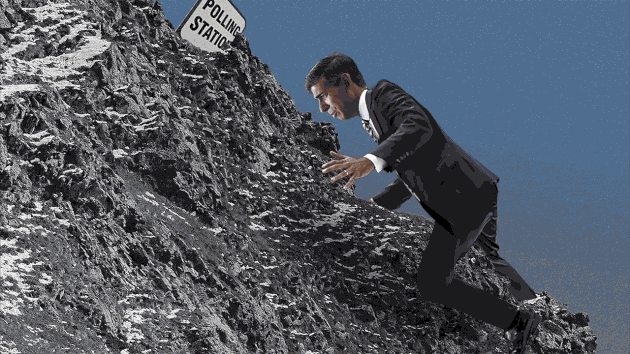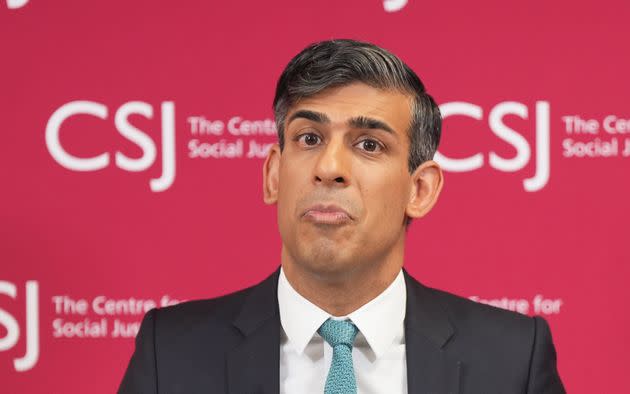Why Rishi Sunak's Electoral Mountain Has Become An Impossible Climb

In less than a fortnight’s time, on May 2, millions of voters across the country will go to the polls for local elections.
With experts unanimously predicting catastrophe for the Tories, it is no exaggeration to say that they could seal Rishi Sunak’s fate.
Tory commentator Tim Montgomerie certainly thinks so, telling Sky News: “I think it’s very likely, in two weeks’ time, we will have some kind of leadership contest in the Conservative Party.”
Even if the prime minister were to survive until the summer, new polling seen by HuffPost UK this week suggests that his chances of somehow pulling off a general election win are effectively zero.
On every measure, the Tories are trailing Labour by a huge margin, with no chance of them closing the gap between now and polling day.
Add in the latest revelations of Tory sleaze, as well as further delays to his flagship Rwanda plan, and it’s easy to see why there is universal gloom among Conservative MPs.
One former cabinet minister said: “The main problem for Rishi is that he’s trapped. There’s nothing he can do now to win the election and so he’s retreated to the Downing Street bunker.
“The smart thing to do would be to have an election soon so we have at least some chance of electing enough MPs to be a decent opposition, but those around the PM are more concerned with having another six months in No.10 on their CV. That’s where we are now.”
Any Tories seeking even a glimmer of hope will be horrified by the latest polling by the More in Common think-tank, which demonstrates beyond a shadow of a doubt that the party is heading for catastrophe whenever the election takes place.

Labour enjoys a healthy 17-point lead over the Tories, but that only tells a small part of the story.
More in Common also found that Keir Starmer’s party is now ahead of the Conservatives among all but the most diehard Tories.
“Not only do Labour have a big lead, but it’s a broad lead amongst different voter groups, which matters in terms of turning votes into seats,” said Luke Tryl, the organisation’s UK director.
Everywhere they looked, Tory support has collapsed. At the 2019 election, 56% of Red Wall voters backed the Conservatives as former Labour voters flocked to Boris Johnson. That figure now stands at just 24%.
In the so-called ‘Blue Wall’ in the south west of England, the Tory numbers have tumbled from 45% to 30% since 2019, while among blue collar Conservatives the party is at 34%, compared to 65% five years ago.
Even among traditional Tories - the party’s diehard base - support has slumped from 79% to 48%.
The Conservatives’ plight is probably best summed up by the fact that 61% of the electorate have already made up their mind not to vote for the party next time round.
Tryl said: “We’ve looked at elections going back to 1987. The size of the Labour lead is now only surpassed by 1997. It would be historically very unusual for Labour to lose from this position.
“If we’re looking at history as a guide, it does not portend well for any chance of a Conservative comeback.”
Sunak’s various attempts to turn around his party’s fortunes also appear doomed to failure.
The much-trumpeted decision to cut 4p off National Insurance - with the aim of eventually scrapping the charge altogether - has landed badly with voters, even though it lets them keep more of their earnings.
Barely 30% of voters believe it is good for the country, while the public are evenly split over whether it benefits them financially.
“It does seem, from a purely political point of view, that the Conservatives made the wrong choice focusing on National Insurance [rather than] cutting income tax,” said Tryl. “People still make that link between National Insurance and their pensions.”
Sunak’s hint that he would be prepared to take the UK out of the European Convention on Human Rights if it meant flights to Rwanda might finally take off also has the potential to be a major political own goal.
Although such a move would have the backing of those already planning to vote Tory, it is “very unpopular” with other groups, Tryl said.
“Any campaign to leave starts at a distinct disadvantage because people are more likely to say Britain should stay in the convention,” he said. “This isn’t from some great love of human rights, the biggest risk to the Conservatives is people think it’ll be like Brexit 2.0.
“People express real exhaustion with the idea that we would go through it all again.”
More in Common’s findings chime with other polling, with Ipsos this week putting the Conservatives on just 19% - their lowest ever level of support in the company’s 45-year history.
Other polls, meanwhile, have predicted the Tories could even be left with fewer than 100 MPs after the election, a result which would be cataclysmic for the party and all-but guarantee at least a decade of Labour rule.
Sunak’s loosening grip on his troops was demonstrated by last week’s vote on his phased smoking ban, with leadership hopefuls Kemi Badenoch, Penny Mordaunt, Robert Jenrick and Priti Patel among those who rebelled against their boss.
The PM’s decision not to force through his Safety of Rwanda Bill this week, choosing instead to delay it until next week, also baffled many of his MPs.
One told HuffPost UK: “It’s not something they are in a tearing hurry to road test because presumably there are major doubts about how it will survive contact with the courts.”
With any light at the end of the Tory tunnel most likely an oncoming train, Sunak has little option other than to strap himself in and brace for impact.
Whether he will survive to emerge from the electoral wreckage remains to be seen.

